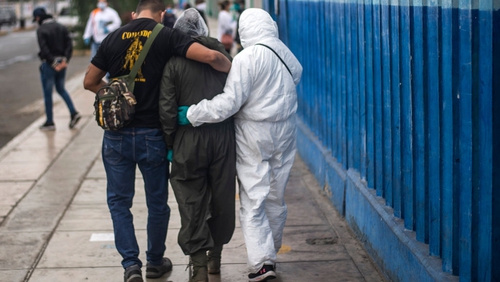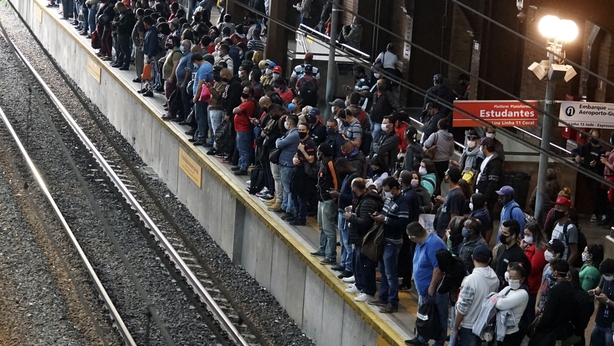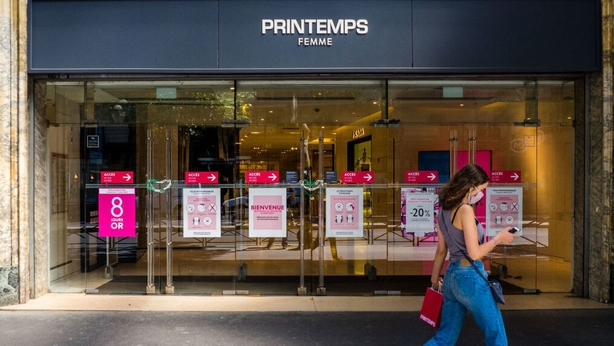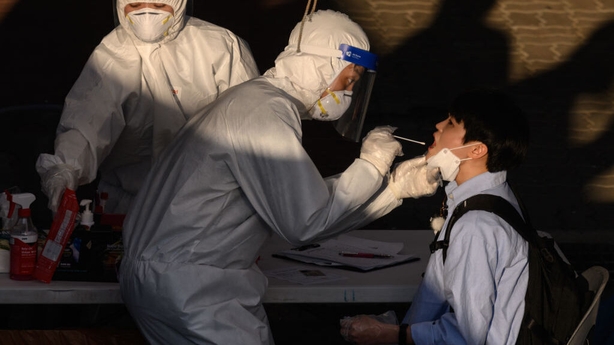
Virus tolls surge in Americas as Europe reopens
The death toll from the coronavirus has spiked again in the United States, and Latin America's pandemic crisis deepened, as Europe's reopening from lockdown continued.
Grim figures from the Americas were accompanied by the growing economic fallout, with the number of people filing unemployment claims in the US reaching 40 million, and Brazil shedding five million jobs.
But Europe pressed on with efforts to return to normality, with the English Premier League and Italy's Serie A unveiling plans to resume play.
Populations are learning to adjust to life with the long-term threat of infection as the virus continues its march around the globe and a vaccine remains elusive.
Pharmaceutical firm bosses expressed optimism a jab could be rolled out by year's end but warned of "daunting" challenges in producing the 15 billion doses needed to curb the pandemic.
Well over 100 labs around the world are workding to come up with a vaccine, including 10 candidates that have made it to the clinical trial stage.
"If things go well, and the stars are aligned, we will have enough evidence of safety and efficacy so that we can... have a vaccine around the end of October," said Pfizer boss Albert Bourla.
Read More:
Caution needed on cross-country Covid-19 comparisons
Experience of schools re-openings in other countries will be examined
Latest coronavirus stories
The urgency was underlined by surging death tolls in South America, increasingly the new focus of the pandemic, where Brazil recorded more than 1,000 fatalities and a national one-day record for infections.
Chile also logged a record daily death toll and in Peru total fatalities topped 4,000.
With limited sanitation and little space for social distancing, millions of people in slums across the region cannot take basic precautions recommended by health authorities and have little to fall back on when lockdowns destroy jobs.

The economic toll on workers around the world was illustrated further with news that French car giant Renault plans to cut 15,000 jobs as part of a two billion euro cost-cutting drive.
British budget airline EasyJet also said it would axe up to 30% of its staff, and Japanese carmaker Nissan reported a huge $6.2 billion annual net loss.
Seeking to stem the bleeding, Europe has been carefully moving ahead with the lifting of restrictions on daily life, with France set to reopen bars, restaurants and museums next week and Britain sending children back to school over the next two weeks.
"Freedom will be the rule and restrictions the exception," French Prime Minister Edouard Philippe said.
Residents enjoyed the reopening of iconic department store Printemps - and the news that restaurants can serve patrons on outside terraces from 2 June.

At the country's museums, face masks will be required.
Citizens will also be allowed to travel more than 100 kilometres (60 miles) from their homes, just in time for the summer holidays.
"The virus is still present to varying degrees across the territory," Mr Philippe warned as he unveiled the new measures, urging citizens to respect social-distancing guidelines and be vigilant about hand-washing.
France has recorded 28,662 virus-related deaths - the fourth highest total in the world.
Elsewhere in Europe, Spaniards were revisiting old joys as life gets back on track - with people seen belting out tunes from classic movie "Grease" at a 1950s-themed drive-in theatre in Madrid.

Spain will allow 70% of the population to go to restaurants, swimming pools and shopping centres from next week.
A reopening of borders within Europe is currently planned for mid-June, but so far openings have been announced haphazardly by individual countries, despite calls from the European Commission for coordination.
Globally the death toll is nearing 360,000 and almost 5.8 million people have been confirmed as infected since the virus emerged in China late last year.
But many countries that have seen success in curbing the virus since early outbreaks are now on alert for a second wave of infections, with South Korea and Sri Lanka showing renewed signs of caution.
South Korea - held up as a global model in how to stop the virus - has reimposed some social distancing rules after a series of new clusters emerged, many in the capital Seoul.

Museums, parks and art galleries were closed again from today for two weeks and companies urged to reintroduce flexible working practices. The numbers of children in Seoul schools will also be cut back.
And in Sri Lanka, some lockdown rules will be rolled out again from Sunday after more than 250 returnees from Kuwait were found to be infected.
The United States has now seen over 101,000 deaths from the disease.
"To all of the families & friends of those who have passed, I want to extend my heartfelt sympathy & love for everything that these great people stood for & represent. God be with you!" President Donald Trump tweeted.
He also continued to blame China for the emergence of the virus.
Washington DC will slowly move into its phase one of reopening today as more parts of the country open up the economy, sometimes against the advice of health experts.
India's coronavirus death toll has passed China's with 175 new fatalities in 24 hours taking the total to 4,706, according to official data.
India is emerging as a new hotspot with record jumps in new cases in recent days.
Figures from India's health ministry showed 165,799 infections, with western Maharashtra state - home to the finance hub of Mumbai - accounting for 36% of cases and 42% of deaths.
China reported no new deaths or new suspected cases today, with the toll still at 4,634 and a total of 82,995 infections.